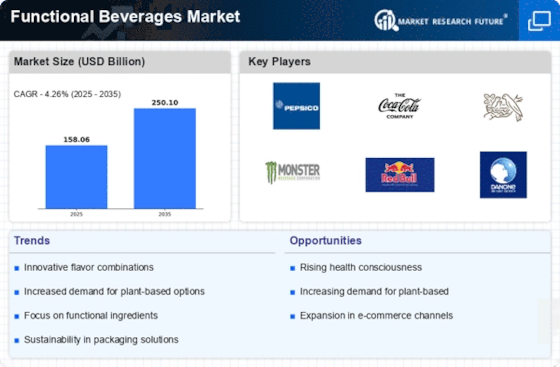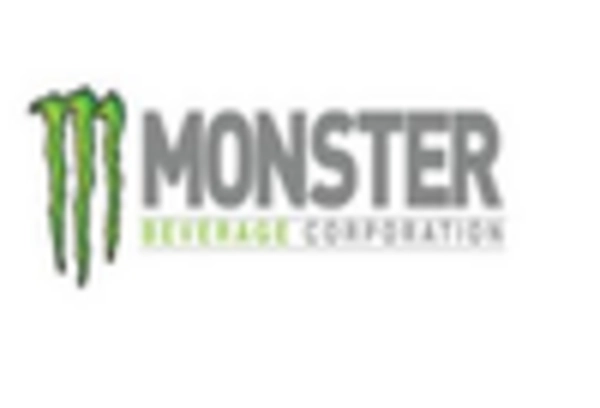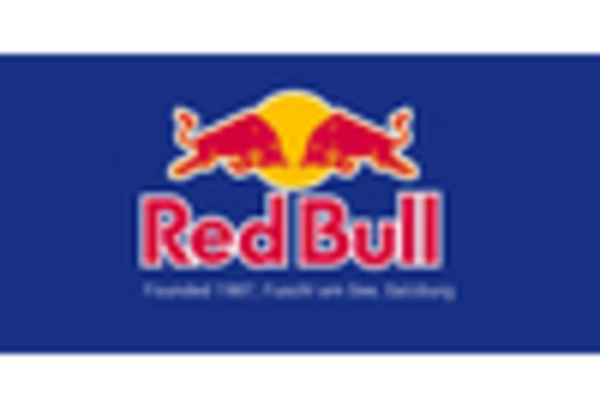Energy Drinks
Sports Drinks
Nutraceutical Drinks
Functional Water
Tea-based Beverages
Athletes
Health-conscious Consumers
Fitness Enthusiasts
Busy Professionals
Elderly
Supermarkets and Hypermarkets
Convenience Stores
Online Retail
Health and Wellness Stores
Specialty Stores
Vitamins
Herbal Extracts
Amino Acids
Probiotics
Electrolytes
North America
Europe
South America
Asia Pacific
Middle East and Africa
North America Outlook (USD Billion, 2019-2035)
Functional Beverages Market by Product Type
Energy Drinks
Sports Drinks
Nutraceutical Drinks
Functional Water
Tea-based Beverages
Functional Beverages Market by Target Audience Type
Athletes
Health-conscious Consumers
Fitness Enthusiasts
Busy Professionals
Elderly
Functional Beverages Market by Distribution Channel Type
Supermarkets and Hypermarkets
Convenience Stores
Online Retail
Health and Wellness Stores
Specialty Stores
Functional Beverages Market by Ingredient Type
Vitamins
Herbal Extracts
Amino Acids
Probiotics
Electrolytes
Functional Beverages Market by Regional Type
US
Canada
US Outlook (USD Billion, 2019-2035)
Functional Beverages Market by Product Type
Energy Drinks
Sports Drinks
Nutraceutical Drinks
Functional Water
Tea-based Beverages
Functional Beverages Market by Target Audience Type
Athletes
Health-conscious Consumers
Fitness Enthusiasts
Busy Professionals
Elderly
Functional Beverages Market by Distribution Channel Type
Supermarkets and Hypermarkets
Convenience Stores
Online Retail
Health and Wellness Stores
Specialty Stores
Functional Beverages Market by Ingredient Type
Vitamins
Herbal Extracts
Amino Acids
Probiotics
Electrolytes
CANADA Outlook (USD Billion, 2019-2035)
Functional Beverages Market by Product Type
Energy Drinks
Sports Drinks
Nutraceutical Drinks
Functional Water
Tea-based Beverages
Functional Beverages Market by Target Audience Type
Athletes
Health-conscious Consumers
Fitness Enthusiasts
Busy Professionals
Elderly
Functional Beverages Market by Distribution Channel Type
Supermarkets and Hypermarkets
Convenience Stores
Online Retail
Health and Wellness Stores
Specialty Stores
Functional Beverages Market by Ingredient Type
Vitamins
Herbal Extracts
Amino Acids
Probiotics
Electrolytes
Europe Outlook (USD Billion, 2019-2035)
Functional Beverages Market by Product Type
Energy Drinks
Sports Drinks
Nutraceutical Drinks
Functional Water
Tea-based Beverages
Functional Beverages Market by Target Audience Type
Athletes
Health-conscious Consumers
Fitness Enthusiasts
Busy Professionals
Elderly
Functional Beverages Market by Distribution Channel Type
Supermarkets and Hypermarkets
Convenience Stores
Online Retail
Health and Wellness Stores
Specialty Stores
Functional Beverages Market by Ingredient Type
Vitamins
Herbal Extracts
Amino Acids
Probiotics
Electrolytes
Functional Beverages Market by Regional Type
Germany
UK
France
Russia
Italy
Spain
Rest of Europe
GERMANY Outlook (USD Billion, 2019-2035)
Functional Beverages Market by Product Type
Energy Drinks
Sports Drinks
Nutraceutical Drinks
Functional Water
Tea-based Beverages
Functional Beverages Market by Target Audience Type
Athletes
Health-conscious Consumers
Fitness Enthusiasts
Busy Professionals
Elderly
Functional Beverages Market by Distribution Channel Type
Supermarkets and Hypermarkets
Convenience Stores
Online Retail
Health and Wellness Stores
Specialty Stores
Functional Beverages Market by Ingredient Type
Vitamins
Herbal Extracts
Amino Acids
Probiotics
Electrolytes
UK Outlook (USD Billion, 2019-2035)
Functional Beverages Market by Product Type
Energy Drinks
Sports Drinks
Nutraceutical Drinks
Functional Water
Tea-based Beverages
Functional Beverages Market by Target Audience Type
Athletes
Health-conscious Consumers
Fitness Enthusiasts
Busy Professionals
Elderly
Functional Beverages Market by Distribution Channel Type
Supermarkets and Hypermarkets
Convenience Stores
Online Retail
Health and Wellness Stores
Specialty Stores
Functional Beverages Market by Ingredient Type
Vitamins
Herbal Extracts
Amino Acids
Probiotics
Electrolytes
FRANCE Outlook (USD Billion, 2019-2035)
Functional Beverages Market by Product Type
Energy Drinks
Sports Drinks
Nutraceutical Drinks
Functional Water
Tea-based Beverages
Functional Beverages Market by Target Audience Type
Athletes
Health-conscious Consumers
Fitness Enthusiasts
Busy Professionals
Elderly
Functional Beverages Market by Distribution Channel Type
Supermarkets and Hypermarkets
Convenience Stores
Online Retail
Health and Wellness Stores
Specialty Stores
Functional Beverages Market by Ingredient Type
Vitamins
Herbal Extracts
Amino Acids
Probiotics
Electrolytes
RUSSIA Outlook (USD Billion, 2019-2035)
Functional Beverages Market by Product Type
Energy Drinks
Sports Drinks
Nutraceutical Drinks
Functional Water
Tea-based Beverages
Functional Beverages Market by Target Audience Type
Athletes
Health-conscious Consumers
Fitness Enthusiasts
Busy Professionals
Elderly
Functional Beverages Market by Distribution Channel Type
Supermarkets and Hypermarkets
Convenience Stores
Online Retail
Health and Wellness Stores
Specialty Stores
Functional Beverages Market by Ingredient Type
Vitamins
Herbal Extracts
Amino Acids
Probiotics
Electrolytes
ITALY Outlook (USD Billion, 2019-2035)
Functional Beverages Market by Product Type
Energy Drinks
Sports Drinks
Nutraceutical Drinks
Functional Water
Tea-based Beverages
Functional Beverages Market by Target Audience Type
Athletes
Health-conscious Consumers
Fitness Enthusiasts
Busy Professionals
Elderly
Functional Beverages Market by Distribution Channel Type
Supermarkets and Hypermarkets
Convenience Stores
Online Retail
Health and Wellness Stores
Specialty Stores
Functional Beverages Market by Ingredient Type
Vitamins
Herbal Extracts
Amino Acids
Probiotics
Electrolytes
SPAIN Outlook (USD Billion, 2019-2035)
Functional Beverages Market by Product Type
Energy Drinks
Sports Drinks
Nutraceutical Drinks
Functional Water
Tea-based Beverages
Functional Beverages Market by Target Audience Type
Athletes
Health-conscious Consumers
Fitness Enthusiasts
Busy Professionals
Elderly
Functional Beverages Market by Distribution Channel Type
Supermarkets and Hypermarkets
Convenience Stores
Online Retail
Health and Wellness Stores
Specialty Stores
Functional Beverages Market by Ingredient Type
Vitamins
Herbal Extracts
Amino Acids
Probiotics
Electrolytes
REST OF EUROPE Outlook (USD Billion, 2019-2035)
Functional Beverages Market by Product Type
Energy Drinks
Sports Drinks
Nutraceutical Drinks
Functional Water
Tea-based Beverages
Functional Beverages Market by Target Audience Type
Athletes
Health-conscious Consumers
Fitness Enthusiasts
Busy Professionals
Elderly
Functional Beverages Market by Distribution Channel Type
Supermarkets and Hypermarkets
Convenience Stores
Online Retail
Health and Wellness Stores
Specialty Stores
Functional Beverages Market by Ingredient Type
Vitamins
Herbal Extracts
Amino Acids
Probiotics
Electrolytes
APAC Outlook (USD Billion, 2019-2035)
Functional Beverages Market by Product Type
Energy Drinks
Sports Drinks
Nutraceutical Drinks
Functional Water
Tea-based Beverages
Functional Beverages Market by Target Audience Type
Athletes
Health-conscious Consumers
Fitness Enthusiasts
Busy Professionals
Elderly
Functional Beverages Market by Distribution Channel Type
Supermarkets and Hypermarkets
Convenience Stores
Online Retail
Health and Wellness Stores
Specialty Stores
Functional Beverages Market by Ingredient Type
Vitamins
Herbal Extracts
Amino Acids
Probiotics
Electrolytes
Functional Beverages Market by Regional Type
China
India
Japan
South Korea
Malaysia
Thailand
Indonesia
Rest of APAC
CHINA Outlook (USD Billion, 2019-2035)
Functional Beverages Market by Product Type
Energy Drinks
Sports Drinks
Nutraceutical Drinks
Functional Water
Tea-based Beverages
Functional Beverages Market by Target Audience Type
Athletes
Health-conscious Consumers
Fitness Enthusiasts
Busy Professionals
Elderly
Functional Beverages Market by Distribution Channel Type
Supermarkets and Hypermarkets
Convenience Stores
Online Retail
Health and Wellness Stores
Specialty Stores
Functional Beverages Market by Ingredient Type
Vitamins
Herbal Extracts
Amino Acids
Probiotics
Electrolytes
INDIA Outlook (USD Billion, 2019-2035)
Functional Beverages Market by Product Type
Energy Drinks
Sports Drinks
Nutraceutical Drinks
Functional Water
Tea-based Beverages
Functional Beverages Market by Target Audience Type
Athletes
Health-conscious Consumers
Fitness Enthusiasts
Busy Professionals
Elderly
Functional Beverages Market by Distribution Channel Type
Supermarkets and Hypermarkets
Convenience Stores
Online Retail
Health and Wellness Stores
Specialty Stores
Functional Beverages Market by Ingredient Type
Vitamins
Herbal Extracts
Amino Acids
Probiotics
Electrolytes
JAPAN Outlook (USD Billion, 2019-2035)
Functional Beverages Market by Product Type
Energy Drinks
Sports Drinks
Nutraceutical Drinks
Functional Water
Tea-based Beverages
Functional Beverages Market by Target Audience Type
Athletes
Health-conscious Consumers
Fitness Enthusiasts
Busy Professionals
Elderly
Functional Beverages Market by Distribution Channel Type
Supermarkets and Hypermarkets
Convenience Stores
Online Retail
Health and Wellness Stores
Specialty Stores
Functional Beverages Market by Ingredient Type
Vitamins
Herbal Extracts
Amino Acids
Probiotics
Electrolytes
SOUTH KOREA Outlook (USD Billion, 2019-2035)
Functional Beverages Market by Product Type
Energy Drinks
Sports Drinks
Nutraceutical Drinks
Functional Water
Tea-based Beverages
Functional Beverages Market by Target Audience Type
Athletes
Health-conscious Consumers
Fitness Enthusiasts
Busy Professionals
Elderly
Functional Beverages Market by Distribution Channel Type
Supermarkets and Hypermarkets
Convenience Stores
Online Retail
Health and Wellness Stores
Specialty Stores
Functional Beverages Market by Ingredient Type
Vitamins
Herbal Extracts
Amino Acids
Probiotics
Electrolytes
MALAYSIA Outlook (USD Billion, 2019-2035)
Functional Beverages Market by Product Type
Energy Drinks
Sports Drinks
Nutraceutical Drinks
Functional Water
Tea-based Beverages
Functional Beverages Market by Target Audience Type
Athletes
Health-conscious Consumers
Fitness Enthusiasts
Busy Professionals
Elderly
Functional Beverages Market by Distribution Channel Type
Supermarkets and Hypermarkets
Convenience Stores
Online Retail
Health and Wellness Stores
Specialty Stores
Functional Beverages Market by Ingredient Type
Vitamins
Herbal Extracts
Amino Acids
Probiotics
Electrolytes
THAILAND Outlook (USD Billion, 2019-2035)
Functional Beverages Market by Product Type
Energy Drinks
Sports Drinks
Nutraceutical Drinks
Functional Water
Tea-based Beverages
Functional Beverages Market by Target Audience Type
Athletes
Health-conscious Consumers
Fitness Enthusiasts
Busy Professionals
Elderly
Functional Beverages Market by Distribution Channel Type
Supermarkets and Hypermarkets
Convenience Stores
Online Retail
Health and Wellness Stores
Specialty Stores
Functional Beverages Market by Ingredient Type
Vitamins
Herbal Extracts
Amino Acids
Probiotics
Electrolytes
INDONESIA Outlook (USD Billion, 2019-2035)
Functional Beverages Market by Product Type
Energy Drinks
Sports Drinks
Nutraceutical Drinks
Functional Water
Tea-based Beverages
Functional Beverages Market by Target Audience Type
Athletes
Health-conscious Consumers
Fitness Enthusiasts
Busy Professionals
Elderly
Functional Beverages Market by Distribution Channel Type
Supermarkets and Hypermarkets
Convenience Stores
Online Retail
Health and Wellness Stores
Specialty Stores
Functional Beverages Market by Ingredient Type
Vitamins
Herbal Extracts
Amino Acids
Probiotics
Electrolytes
REST OF APAC Outlook (USD Billion, 2019-2035)
Functional Beverages Market by Product Type
Energy Drinks
Sports Drinks
Nutraceutical Drinks
Functional Water
Tea-based Beverages
Functional Beverages Market by Target Audience Type
Athletes
Health-conscious Consumers
Fitness Enthusiasts
Busy Professionals
Elderly
Functional Beverages Market by Distribution Channel Type
Supermarkets and Hypermarkets
Convenience Stores
Online Retail
Health and Wellness Stores
Specialty Stores
Functional Beverages Market by Ingredient Type
Vitamins
Herbal Extracts
Amino Acids
Probiotics
Electrolytes
South America Outlook (USD Billion, 2019-2035)
Functional Beverages Market by Product Type
Energy Drinks
Sports Drinks
Nutraceutical Drinks
Functional Water
Tea-based Beverages
Functional Beverages Market by Target Audience Type
Athletes
Health-conscious Consumers
Fitness Enthusiasts
Busy Professionals
Elderly
Functional Beverages Market by Distribution Channel Type
Supermarkets and Hypermarkets
Convenience Stores
Online Retail
Health and Wellness Stores
Specialty Stores
Functional Beverages Market by Ingredient Type
Vitamins
Herbal Extracts
Amino Acids
Probiotics
Electrolytes
Functional Beverages Market by Regional Type
Brazil
Mexico
Argentina
Rest of South America
BRAZIL Outlook (USD Billion, 2019-2035)
Functional Beverages Market by Product Type
Energy Drinks
Sports Drinks
Nutraceutical Drinks
Functional Water
Tea-based Beverages
Functional Beverages Market by Target Audience Type
Athletes
Health-conscious Consumers
Fitness Enthusiasts
Busy Professionals
Elderly
Functional Beverages Market by Distribution Channel Type
Supermarkets and Hypermarkets
Convenience Stores
Online Retail
Health and Wellness Stores
Specialty Stores
Functional Beverages Market by Ingredient Type
Vitamins
Herbal Extracts
Amino Acids
Probiotics
Electrolytes
MEXICO Outlook (USD Billion, 2019-2035)
Functional Beverages Market by Product Type
Energy Drinks
Sports Drinks
Nutraceutical Drinks
Functional Water
Tea-based Beverages
Functional Beverages Market by Target Audience Type
Athletes
Health-conscious Consumers
Fitness Enthusiasts
Busy Professionals
Elderly
Functional Beverages Market by Distribution Channel Type
Supermarkets and Hypermarkets
Convenience Stores
Online Retail
Health and Wellness Stores
Specialty Stores
Functional Beverages Market by Ingredient Type
Vitamins
Herbal Extracts
Amino Acids
Probiotics
Electrolytes
ARGENTINA Outlook (USD Billion, 2019-2035)
Functional Beverages Market by Product Type
Energy Drinks
Sports Drinks
Nutraceutical Drinks
Functional Water
Tea-based Beverages
Functional Beverages Market by Target Audience Type
Athletes
Health-conscious Consumers
Fitness Enthusiasts
Busy Professionals
Elderly
Functional Beverages Market by Distribution Channel Type
Supermarkets and Hypermarkets
Convenience Stores
Online Retail
Health and Wellness Stores
Specialty Stores
Functional Beverages Market by Ingredient Type
Vitamins
Herbal Extracts
Amino Acids
Probiotics
Electrolytes
REST OF SOUTH AMERICA Outlook (USD Billion, 2019-2035)
Functional Beverages Market by Product Type
Energy Drinks
Sports Drinks
Nutraceutical Drinks
Functional Water
Tea-based Beverages
Functional Beverages Market by Target Audience Type
Athletes
Health-conscious Consumers
Fitness Enthusiasts
Busy Professionals
Elderly
Functional Beverages Market by Distribution Channel Type
Supermarkets and Hypermarkets
Convenience Stores
Online Retail
Health and Wellness Stores
Specialty Stores
Functional Beverages Market by Ingredient Type
Vitamins
Herbal Extracts
Amino Acids
Probiotics
Electrolytes
MEA Outlook (USD Billion, 2019-2035)
Functional Beverages Market by Product Type
Energy Drinks
Sports Drinks
Nutraceutical Drinks
Functional Water
Tea-based Beverages
Functional Beverages Market by Target Audience Type
Athletes
Health-conscious Consumers
Fitness Enthusiasts
Busy Professionals
Elderly
Functional Beverages Market by Distribution Channel Type
Supermarkets and Hypermarkets
Convenience Stores
Online Retail
Health and Wellness Stores
Specialty Stores
Functional Beverages Market by Ingredient Type
Vitamins
Herbal Extracts
Amino Acids
Probiotics
Electrolytes
Functional Beverages Market by Regional Type
GCC Countries
South Africa
Rest of MEA
GCC COUNTRIES Outlook (USD Billion, 2019-2035)
Functional Beverages Market by Product Type
Energy Drinks
Sports Drinks
Nutraceutical Drinks
Functional Water
Tea-based Beverages
Functional Beverages Market by Target Audience Type
Athletes
Health-conscious Consumers
Fitness Enthusiasts
Busy Professionals
Elderly
Functional Beverages Market by Distribution Channel Type
Supermarkets and Hypermarkets
Convenience Stores
Online Retail
Health and Wellness Stores
Specialty Stores
Functional Beverages Market by Ingredient Type
Vitamins
Herbal Extracts
Amino Acids
Probiotics
Electrolytes
SOUTH AFRICA Outlook (USD Billion, 2019-2035)
Functional Beverages Market by Product Type
Energy Drinks
Sports Drinks
Nutraceutical Drinks
Functional Water
Tea-based Beverages
Functional Beverages Market by Target Audience Type
Athletes
Health-conscious Consumers
Fitness Enthusiasts
Busy Professionals
Elderly
Functional Beverages Market by Distribution Channel Type
Supermarkets and Hypermarkets
Convenience Stores
Online Retail
Health and Wellness Stores
Specialty Stores
Functional Beverages Market by Ingredient Type
Vitamins
Herbal Extracts
Amino Acids
Probiotics
Electrolytes
REST OF MEA Outlook (USD Billion, 2019-2035)
Functional Beverages Market by Product Type
Energy Drinks
Sports Drinks
Nutraceutical Drinks
Functional Water
Tea-based Beverages
Functional Beverages Market by Target Audience Type
Athletes
Health-conscious Consumers
Fitness Enthusiasts
Busy Professionals
Elderly
Functional Beverages Market by Distribution Channel Type
Supermarkets and Hypermarkets
Convenience Stores
Online Retail
Health and Wellness Stores
Specialty Stores
Functional Beverages Market by Ingredient Type
Vitamins
Herbal Extracts
Amino Acids
Probiotics
Electrolytes



















Leave a Comment